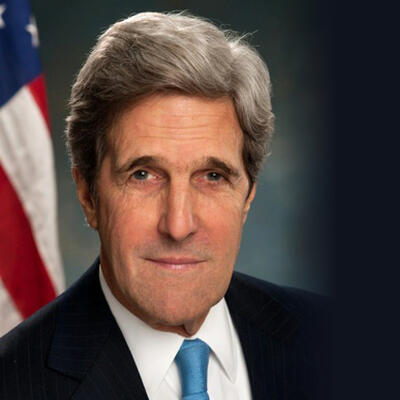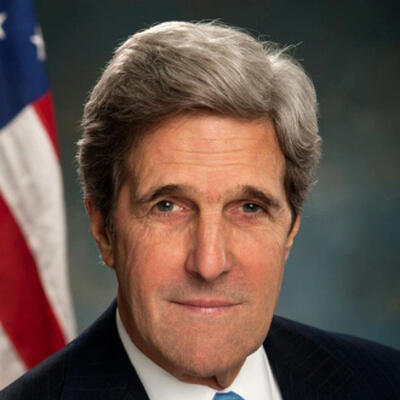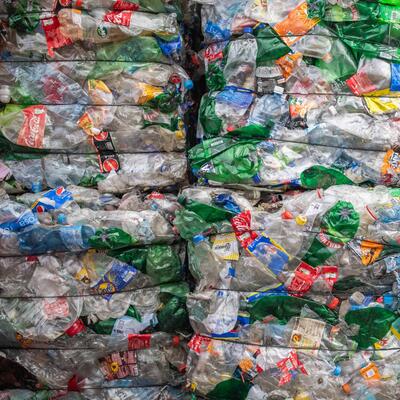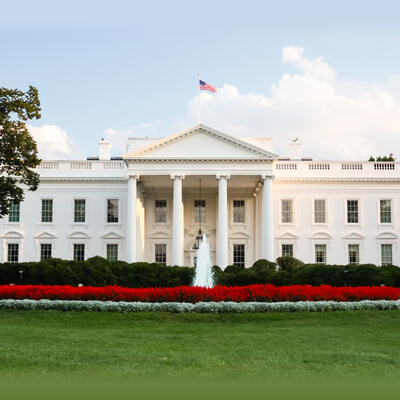
John Kerry: The Global Dynamics Of Decarbonization
Guests

John Kerry

Lisa Fischer

Julia Poliscanova

Justin Wu

David Sandalow
Summary
What will it take to get the world’s major economies off fossil fuels? In late 2019, former US senator and secretary of state John Kerry, declared a World War Zero on carbon pollution.
“It’s really putting the nation on a war footing to avoid the next pandemic which will be exacerbated by the climate crisis, and the way to get ahead of it is to prepare and make the decisions now,” says Kerry. “The long-term energy future of America is not going to be written in fossil fuels”
The COVID-19 pandemic is expected to cut U.S. carbon emissions by 7.5% in 2020 — exactly the rate needed globally to meet the climate goals outlined in the Paris Agreement. But can other major emitters like China and Europe make plans to decarbonize at the same rate without throwing their economies over a cliff?
“You really can't make any progress on climate without China making an effort,” says Justin Wu, Head of Asia-Pacific, at Bloomberg New Energy Finance.
“China basically has hit some of the climate goals it announced a few years ago, including the ones that were part of the Paris agreement,” Wu explains, “but so far hasn't announced any new goals yet. So we’re still waiting to see whether it has something more ambitious in store.”
Meanwhile, in December 2019 European Union announced a $1 trillion green deal aimed at transforming the 27 member economies to higher quality of life and lower carbon emissions.
“In Europe we are only now catching up with China,” says Julia Poliscanova, Senior Director of Vehicles & E-mobility at the Brussels-based advocacy group Transport & Environment, “so we will see. The race is on, that’s for sure and we see Europe catching up.”
Segments for this program were recorded between April 21 and June 26, 2020.
Related Links:
World War Zero
Bloomberg NEF
Columbia University Center on Global Energy Policy
Transport & Environment
E3G
Full Transcript
Greg Dalton: This is Climate One. I’m Greg Dalton.
John Kerry: The long-term energy future of America is not going to be written in fossil fuels.
Greg Dalton: Former secretary of state John Kerry launched the World War Zero coalition in late 2019 with the goal of getting to zero-carbon.
John Kerry: It’s really putting the nation on a war footing to avoid the next pandemic which will be exacerbated by the climate crisis, and the way to get ahead of it is to prepare and make the decisions now.
Greg Dalton: What are other big emitters doing to act on climate while dealing with covid?
Justin Wu: You really can't make any progress on climate without China making an effort.
Lisa Fischer: The U.K. has been a frontrunner on embedding climate in its policymaking.
Julia Poliscanova: The race is on, that’s for sure and we see Europe catching up.
Greg Dalton: Decarbonizing the Global Economy. Up next on Climate One.
---
Greg Dalton: What will it take to get the world’s major economies off fossil fuels? Climate One conversations explore all dimensions of the climate challenge, the exciting and scary, the individual and systemic. I’m Greg Dalton.
John Kerry: The purveyors of doubt and lies and distortion have declared war on common sense and science. And we need to fight back.
Greg Dalton: In late 2019, former US senator and secretary of state John Kerry, declared a World War Zero on carbon pollution. The name highlights both the national security threat posed by global warming and the type of wartime mobilization needed to cut carbon emissions. U.S. emissions are forecast to drop 7% this year – about the rate of decline needed globally to meet the Paris climate commitments. But can those commitments be met without sending the economy off a cliff like Wile E. Coyote in the old cartoons?
John Kerry: The commitment is made if you make a transition and begin to do the things necessary to not make this the result of a catastrophe but to make it part of everyday life. The bet in Paris was that people are gonna begin immediately to be able to make that transition. And for the first two years after Paris, $358 billion a year was invested in alternative renewable energy. So the first time ever more money began to shift away from fossil fuel and into sustainable energy. If we had stayed on that track and the United States to continue to lead, we would be in a position now to begin to see where you would meet that point where these could be sustainable reductions in five years, six years, 10 years by bringing online smart grids the capacity to send energy from one part of the country to the other. Beginning to transition out of coal into alternative energy sources large solar fields, windfarms, hydrogen fuel mixed with hydro and geothermal, and other things. But none of that planning, none of it, has taken place with a hand of the partnership between government and the private sector. And so, in fact, the opposite has happened. We have a president who pulled out of the agreement giving license to a bunch of countries in the world that were reluctant to join anyway to go back to being reluctant. And so the people we dragged to the table in Paris have become, you know, scofflaws. And in fact no nation in the world was on track to meet the Paris agreement until coronavirus hit and everything shut down. Now obviously that's not the way anybody envision doing it. We need to do it because we’re shifting out of the polluting fuels. And we haven't been doing that fast enough or in a concerted way. The way we’ll do it is by planning by enlisting the private sector to become part of the transition by creating a framework within which citizens across the country can afford to go buy electric vehicles. Get the auto manufacturers commit and cooperate and show you their plans for a faster transition out of internal combustion into electric. Building out a program from the federal government to assist in building out the infrastructure necessary for the charging. I mean it’s planning it’s really putting the nation on a war footing to avoid the next pandemic. And the next pandemic will be exacerbated by climate crisis and the way to get ahead of it is to prepare and make the decisions now.
Greg Dalton: James Baker and George Shultz, two elders in the Republican Party recent wrote an article in foreign affairs, saying that China is now the top provider exporter of wind turbine, solar panels, batteries, the building blocks of a clean energy economy. But most of their party doesn't really listen to them anymore. Their party is in a very different place. Why aren’t more Republicans listening to James Baker and George Shultz?
John Kerry: Well, let me just say first of all that you should add that China is also the largest exporter of climate change emissions now. They are the dirtiest fuel provider in the world. They provide 50% of all the coal-fired power plants in the world are Chinese. And Chinese are now funding the building of new coal-fired plants through their one belt one road initiative. So we have a major, major issue to raise with China. We would like to cooperate, they should be able to cooperate. We did cooperate in Paris, but this administration not only doesn't try to go proactively to do that they're moving in the opposite direction here at home by unleashing much greater levels of pollutants into the air, cutting back on the automobile restrictions, cutting back on the pollution restrictions that existed. So that has to be the predicate and that's part of the reason why that party today won't listen to George Shultz and Jim Baker the way they ought to. They are radical antigovernment disruptors who really want to just pull the system down they’re against any kind of government. Many of them are libertarians and they want to see no action whatsoever on those fronts because their definition of freedom is the freedom to be able to pollute to do the things they want to do. Jim Baker and George Shultz have a great idea which is pricing carbon. And the answer is it is one of the single most effective ways that we could begin to reduce emissions by properly pricing carbon in terms of its economic impact and cost to all of us as citizens. What a lot of people ignore unfortunately, is that here in the United States we are currently spending vast sums of taxpayer money in order just to clean up after the impacts of climate change. We had three storms two years ago that cost our taxpayers $265 billion just to clean up. Maria, Irma and Harvey. And so Sir Nicholas Stern has written a very important book about the economics of climate change and he makes it crystal clear. It is far, far more expensive to pay for in action than to take actions. Unfortunately, too many of the members of today's so-called Republican Party are ready to ignore all of the signs, all of the science because they are fundamentally afraid of what the social media will do to them through the encouragement of the current president who uses this for as a political wedge.
Greg Dalton: We keep hearing though rumblings of a new position or a new story. Kevin McCarthy some openings there. Of course we’ve been hearing that since 2015 when Pope Francis came to Washington DC and some Republicans came out and said, hey, we need to do that move on climate with the Pope’s political cover. Do you give any credence to the idea that there is openings and softening in the Republican Party?
John Kerry: I think that what you see right now are pure political moves that are being made gingerly by a few people who are beginning to fear that the Republican Party may lose the next generation on this issue. And I've heard various people from Frank Luntz to a few other representatives and senators start lamenting that their party isn't needs to get on the bandwagon so to speak. So for the moment I think it's rhetorical. It's obviously political and it's insufficient to the task of meeting the challenge of what we need to do to get the job done. And ironically, maybe not ironically, it's a wrong word, but sadly, these guys are really missing the boat because the fact is the world's greatest economic opportunity is the energy market is the biggest marketplace in the world it's fortified billion users today. It's a multi-trillion dollar market it’s going to grow hugely over the next years. In fact, there will be 9 billion users by about 2050 and the United States of America is not in the hunt to be the technology leader to be the country that is producing the innovations necessary to meet this task. And that's really giving up a major market without a fight, which is quite un-American in my judgment.
Greg Dalton: Well, right now those markets are in turmoil. Oil, recently, went into a negative price. The world is awash in oil that's affecting there's a lot of industries receiving help in the United States, airlines, etc. Should the oil industry receive help and what do you make of the chaos right now with negative oil price?
John Kerry: Well the chaos reflection of negative oil prices is because there’s a glut in the marketplace. It's a supply demand curve. And the fact is that it went down or whatever it was 37 bucks negative. It doesn't mean really people are gonna pay for that but people who are playing with futures are sort of paying the piper, so to speak. Because it will go back up and we’ll get back to it. People aren’t driving today I mean there’s aren’t that many cars on the road. There's not that much demand for gasoline and oil. So people are actually putting some of it on tankers offshore just trying to find a place to store it until the value goes back up and they can sell it again. What I think we have to be thinking about is what do we want to do coming out of this crisis. How do we rebuild our economy. This is an enormous opportunity for us not to just go back to business as usual. But to be funding things in our infrastructure program that are going to build that energy capacity of the future. America doesn't even have a grid. We don't have the ability to send clean energy from one part of the country to the other. We should. It's just common sense.
Greg Dalton: And it’s not in these packages so far. None of that.
John Kerry: No, none of that is in these packages. And that’s again an absence of leadership. Just no vision at all about what we ought to be doing. This is an opportunity if we’re gonna spend the money the last thing we should be doing is spending it to keep digging that hole. You know, the definition of insanity is when you keep making the same mistake over and over again. My hope is that we’ll have a day of reckoning. And I think certainly with the election if we get a new president who is committed to this, then we will have a very significant debate in this country about where we need to head in the future. It makes sense to invest in a whole bunch of things including innovation and research. We should have the largest single commitment ever in the history of our country to R&D for all of our colleges and universities our labs everybody be in the hunt for major battery storage. The day we win the battle of battery storage and get it into weeks literally two weeks three weeks we are going to win the battle. We’ve won the battle of climate. Because the minute you have that storage then you can wholesale stopgap the problem of baseload for companies factories. They got to know that their factory, their production is not gonna be interrupted by the lack of wind or the lack of sun. You've got to have the storage to provide that continuity. The day we have that you're gonna see a massive shift out of fossil fuel and a massive shift. Now, it doesn't mean fossil fuel goes away within everybody within the scientific analysis of where we need to be to have equilibrium and solve the problem of climate there is a carbon budget. We will still be using oil for various things. We will still need some natural gas as a bridge fuel. But the long-term energy future of America is not going to be written in fossil fuel. Climate is no longer over the horizon climate is happening now. So I am convinced that this is going to open people up to reality into wanting to have leaders who don't hide behind lies, distortions, financed delays by big corporations that don't want to change. People have had it with that. They’ve seen how disruptive it is to their lives. And I think they’re gonna be deeply motivated, highly motivated to make sure that we have accountability from people in public office.
Greg Dalton: Last question Secretary Kerry. Flying has changed in America around the world. The world is not flying. Can you see when going back to whatever normal are you gonna fly less yourself and do more like we’re doing this right now on video?
John Kerry: I'm convinced that everybody will be doing more Zoom meetings, more meetings one kind, more Skype whatever. I've heard from more friends have said you know, I've got more done at home in the last weeks and I scratch my hands and say, what was I doing doing all those things. Get in a plane and flying here and there. I think it will change life in that regard. I don't know how much I don’t think anybody knows how much. Still there will be things that you’ve got to do personally. There’ll still be travel, there’ll still be, you know, leisure and entertainment travel and so forth and so on. It’ll take a while to get back to it. But also airplanes, you know, that's ultimately going to change. I mean airplanes I think are going to, they're going to find a different source of power, different fuel. Biofuels, whatever it’s gonna be maybe even hydrogen, who knows. But, we’ll solve these problems. That I am convinced that if we get leadership that wants to solve them that is ready to acknowledge reality, truth, facts, two and two is four. And we got a bunch of people who are trying to argue that it's five right now. No, it is four. And there are certain things where we know it's a fact, and the fact is, we know that human beings are contributing to this climate crisis. We also know, human beings can solve the problem. We have many of the solutions right in front of us now and we will find the rest of those that are needed. I have total confidence in our ingenuity. We just need the willpower. It's not a question of lack of capacity it’s just willpower, readiness, commitment. And we need to make that commitment.
---
Greg Dalton: Former US senator and secretary of state John Kerry on decarbonizing the global economy. Coming up, how China can – and needs to be – part of that effort.
Justin Wu: China basically has hit some of the climate goals it announced a few years ago, including the ones that were part of the Paris agreement, but so far hasn't announced any new goals yet. So we’re still waiting to see whether it has something more ambitious in store
Greg Dalton: That’s up next, when Climate One continues.
---
Greg Dalton: This is Climate One. I’m Greg Dalton, and we’re talking about decarbonizing the global economy. Getting the United States and China to collaborate - on anything - has never been easy.
David Sandalow: I think if you could've imagined one issue that you thought might bring the two countries together to work, it would be a global pandemic but to the contrary, that's not happening.
Greg Dalton: David Sandalow is Inaugural Fellow at the Center on Global Energy Policy at Columbia University and author of the Guide to Chinese Climate Policy. He’s joined by Justin Wu, Head of Asia-Pacific at Bloomberg New Energy Finance or NEF. In October of 2017, Chinese President Xi Jinping said that “China is taking the driving seat in international cooperation to respond to climate change.” Could that still be true as the country grapples with the COVID pandemic?
Justin Wu: I guess we can say it’s still true to a certain extent. Let’s say China is still part of the Paris agreement and hasn’t changed its stance on that. Recently, it has said that it’s sort of carbon intensity reduction goals and its carbon emissions per GDP goals. Two years early actually it had a goal of reducing it about 45% from 2005 levels by 2020 and then the country hit the goal actually in 2018. But what happened was actually it failed to announce a new goal in the middle of the COVID crisis. So, you know, I think when you look at China and these types of goals often they would announce goals that seemed really good on paper but they're relatively easy to hit and then the expectation is that it would always announce a more ambitious goal later on. But this time in the middle of the COVID crisis it basically has hit some of the climate goals it announced a few years ago, including the ones that were part of the Paris agreement, but so far hasn't announced any new goals yet. So we’re still waiting to see whether it has something more ambitious in store for later on.
Greg Dalton: Yeah, and around the world we’re not seeing rising ambition toward carbon goals. David Sandalow, is China easing off on its climate progress?
David Sandalow: Maybe it's worth just highlighting how important the question you just asked us, Greg, because some of your audience well maybe not everybody, China is the largest greenhouse gas emitter in the world by far. Last year, China’s emissions were greater than the emissions of the U.S., Europe and Japan combined. And so China is essential to any solution to climate change. Now it’s also important to note that China's cumulative emissions over a couple of centuries have been less than half those of the United States and CO2 stays in the atmosphere for hundreds of years. And China’s per capita emissions are less than half those of the United States. But what China does is absolutely essential and so your question about China’s ambition is really important. I agree with what Justin said, Chinese government remains committed to the Paris agreement and the Paris process. But at the same time, I saw even starting last year a lessening of a priority for climate change as I think compared to prior years. And I think also less in priority on some air pollution issues. In 2015, 2016 the statements from the Chinese leadership about coal really emphasized backing out coal from the energy mix and making sure that air pollution and greenhouse gas issues were addressed. Last year even before COVID there was a prominent speech by Premier Li Keqiang in which he talked about developing coal and then that was repeated again in the opening speech of the National People's Congress in May of this year. So I think there's been, it’s a reduction in the priority this receives. Now, the Fortune five-year plan process coming up is gonna be very important in terms of ambition going forward so we’ll see how that goes.
Greg Dalton: Coal is king in China. It consumes more than half of the world's coal. Coal use in China trended downwards and then it seems to have ticked up recently. So, Justin, is some of the gains on coal reduction in China being erased is coal rebounding?
Justin Wu: Yeah. I mean I think when you look at China and climate, I mean to David’s point earlier you can always take a half full or half empty approach. I think the story of coal is that, you know, as you rightly pointed out it has been trending down in terms of its contribution to power generation in China. Its overall use is sort of the growth has slowed and in some cases trending downwards. But at the same time we’re expecting China to build another 100 or 150 GW of coal power in the next five years. So that's more than any other country actually in the world more than India, which is a distant second. As you look at the beginning of the year what's really interesting is with the lockdown that happened in China due to the COVID pandemic coal use actually has plummeted. So as power demand fell within the country actually it was coal power generation that fell relative to other sources of power generation. But as things eased up in April and May as we’re looking in the data more recently it was actually back with a bit of a vengeance. So it was almost some of the factories were making up for lost time and cogeneration actually spiked a bit in April. And then the question is, you know what is the rest of the year look like, right is it gonna be are we gonna follow a pattern very similar to the post-2008 financial crisis where actually factories roared back to life and we saw emissions actually tick up over the next couple of years as the government tried to stimulate and recover the economy or are we gonna take a more moderate approach. Early signs is that it seems like the government is taking a bit more of a moderate approach this time around. But it’s still early days and obviously, you know, I think we see the economic priorities will take sort of take precedence over other things. So there’s really an effort to really push to recover the economy we could see things sort of rebound, such as emissions or factories and things like that.
Greg Dalton: Some reports that they’re really focusing on jobs and this recovery where they focused on GDP as growth targets in the past. David Sandalow, there are some talk not yet codified yet in Europe about having a green recovery coming out of the COVID crisis. Is it possible that Europe could surge ahead or be more aggressive coming out of COVID? What we’re hearing here is China has put a clean recovery front and center. They’re trying to get their economy back on track get jobs back in place. Is that fair?
David Sandalow: I think a green stimulus is getting less attention in Beijing than in Brussels but more attention than in Washington DC right now where there's really no help in that topic. One interesting point about the first quarter of 2020 in China in the energy sector is that its coal power plummeted as Justin said, solar power actually increased solar generation to be precise. In the first quarter of 2020 according to statistics I've seen solar generation actually increase 10 to 12% as compared to the prior year, which is pretty striking given that the economy drops around 6 or 7%. And I think the reason is because in China there’s about 30 GW of new solar power capacity added during 2019 and then there's been power sector reforms so there's now renewable electricity quarters in some provinces. So renewable electricity actually comes onto the grid first in some province which a change from prior years. I think on your question about green stimulus to elaborate further, in the last big recession in 2009 Chinese investment in infrastructure in many ways led the world in terms of recovery that demand was hugely important. There’s a lot of heavy infrastructure investment. The Chinese government I think is signaling first of all that the stimulus measures are not gonna be as big as they were back in 2009. And there's concern I think about indebtedness and the Chinese system that limits that. But also that it's going to be new infrastructure investments not the type of heavy construction investments in the same way but “new infrastructure.” And some of the examples of new infrastructure that have been given are clean energy including infrastructure for electric vehicles and high-voltage transmission lines, mass transit investments and then some other type of investments like 5G. So I think that's the dialogue as I've heard of right now that’s going on a green stimulus in China.
Justin Wu: Yeah, I would agree with that. Just to add one on that one. I think it's important to and I like David sort of arranging in a way in terms of Brussels, Beijing and Washington in terms of the greenness of the stimulus. But I would add the one now is a lot more focused on sort of digital infrastructure, new technologies, you know, the effort is to build a more service-based high-value economy versus one that’s more focused on manufacturing. So I think it's important to understand that this stimulus is more about a longer-term goal towards China's economic transformation, rather than a specific I would say a climate goal. It just so happens it’s less carbon intensive, which probably is a good thing for the world. But I wouldn't really call it a specific green agenda towards, you know, towards reducing emissions although it may have that nice side effect.
Greg Dalton: One other thing is the strained bilateral relationship that Paris climate accord was really rested on a deal that President Obama made with President Xi and the two big emitters current and historic coming forward and that now has been strained. So how does the strained bilateral relationship and the kind of peer pressure that played a role in Paris with, you know, Modi and Obama and Xi, has that fallen apart or, you know, where does that stand, David?
David Sandalow: Well, you know, big picture, U.S.-China relations are -- it’s difficult as they've been in at least 50 years right now, since the normalization of relations. And I think in the next year they're going to get worse. Like we have trends that are driving us in very difficult directions including nationalism in both countries. And the governments in both countries are not only failing to contain that nationalism, they're inflaming that nationalism and it’s spilling out in a number of ways. I think if you could've imagined one issue that you thought might bring the two countries together to work, it would be a global pandemic but to the contrary, that's not happening. And the climate change agenda, you know, has completely fallen apart under the Trump administration which doesn't believe that climate change is an issue that merits attention. I do think that if there's a Biden administration which that although the U.S. China relationship will remain extremely challenging because there’s really a broad bipartisan consensus in the United States about some of the issues that China presents. So I think the relationship overall will still be very challenging but I think there are at least the desire in both governments to reach agreement on climate change. And I think it won't be easy because there’ll be disagreements on specific issues that will be part of a broader set a very difficult bilateral relationships but at least there’ll be a desire to get to yes. So we’ll see how that develops if there’s a Biden administration.
Greg Dalton: Justin Wu, one thing that people in Silicon Valley and other clean tech investors companies in the United States worry about is that the U.S. is losing competitiveness to China moving ahead. China is gonna own the technologies of the 21st century and that is batteries, solar, etc. Is that still the case or is China perhaps not pulling ahead so far ahead of the U.S. as others might have feared?
Justin Wu: Yeah, I think we need to pick apart that statement a little bit and sort of think about this, right. So I think if you say that China is leading in things like solar panels and batteries and yes, the answer is yes. But I think, you know, you can talk about China’s “leadership" in renewable energy. I think China has been basically playing to its strengths, which is manufacturing, right. It has been a leader in terms of manufacturing the volume of both the cheap and affordable solar panels and now batteries. So it’s done that extremely well and it’s probably gonna be predominant in the supply chain of these components in the future. Now, whether that's technology dominance I think that's debatable because I think there are, you know, you need equipment obviously to build renewable energy projects and other things and cars, electric cars. You need a whole bunch of other things as well, right, materials and software and systems to run it, you know, other things like that. And I think in those other things it’s not so clear that China has a leadership there's a lot of other companies and different countries involved in developing software and other types of things. So I think that’s just important to note when we talk about that part. I’ll just add actually one other point that to your previous question, Greg, about leading climate change. I think, yes, if you look at sort of collaboration between countries and I think that’s not really a great story right now and that’s obviously we need more of that if you want to solve the climate problem. But also I think you need to look at companies as well. And I think actually here we do see more positive signs than in companies around Asia and even in China as well. I think more companies actually are embracing a more sustainable business plan or actually looking at sustainability measures within the business. So it comes back to the question of whether, you know, do we need everything to be government led or do you think companies actually can play a very important role here as well. And over across at least other parts of Asia we do see the corporations and companies are actually taking a much more progressive stance on sustainability in climate than some of the governments in that region.
Greg Dalton: David Sandalow, some recent numbers came up from the famous Keeling Curve, which measures the carbon dioxide concentration of the atmosphere from Mauna Loa and Hawaii. And despite the global economy tanking the last few months, the Keeling Curve shows emissions did not really dip. So what is that tell us about the world economy screeching to a halt, and yet the carbon didn't notice?
David Sandalow: Such an important observation. I think first of all, the global economy came as close as it’s ever come into kind of going into lockdown in the past couple of months. And carbon dioxide emissions dropped in the order of 10% I think the data still coming in but, you know, roughly in that order. So it underscores what incredible challenge we have in decarbonizing the global economy and we need levels of priority and seriousness and governments around the world that we haven't had yet otherwise, we’re not gonna solve this problem. And just another point on the basic science of this, as long as emissions keep happening the concentration in the atmosphere is gonna go up. So even if we cut emissions by 90% the concentration will still be going up in the atmosphere. So we’ve got a long ways to go.
Greg Dalton: Justin Wu, one of this not overlook the fact that you're in Hong Kong and there’s been lot of strife in Hong Kong, and civil liberties being challenged. A lot of things under assault where you are in Hong Kong. Are you optimistic about the future given the climate numbers we just mentioned as well as kind of the other strains?
Justin Wu: Yeah. I think one thing that we can take away from this is, if we wanna solve the climate issue it’s going to be a lot harder than solving this global pandemic. So I don't know if that's comfort for us or not. And David is right, you know, if we look at the lockdown I think for most of all that's been about three months, you know, the Hong Kong protest is just about a year now. The climate, I mean solving this climate issue is gonna require probably a decade or more of actually concentrated effort. Lot of global cooperation and actually a serious change to a lot of things. So, you know, I think the order of magnitude what we need to do with climate is much larger. And obviously it's gonna play out over a couple decades and not sort of just something we can do for a few months or even a few years and hope that we can solve the problem. So, you know, it might be that we can’t sort of use a lockdown or something that dramatically changes people's lifestyles for a long period of time to solve this problem we may need to look at other ways in doing it. But actually I think you know, the issues that we face today really has made it very clear to me and many others that the climate issues is much more difficult to solve than probably initially realized.
David Sandalow: Justin is exactly right. Certainly, lockdown won’t solve this problem. I don't think anybody is suggesting that lock down can solve this problem. I think we need transformation of the global economy. And there's actually evidence that it is possible I think. I mean what we’ve seen with renewable energy in the past decade really underscores the transformation potential of technologies. And I think in the power sector we already have a line in sight to how we can achieve decarbonization now we needed to do that in some other sectors as well. So I don’t think anybody should despair particularly when you look at younger generation and awareness growing around the world on this topic. So I think there’s real hope.
---
Greg Dalton: David Sandalow, author of the Guide to Chinese Climate Policy and Inaugural Fellow at the Center on Global Energy Policy at Columbia University. And Justin Wu, Head of Asia-Pacific at Bloomberg NEF. This is Climate One. Coming up, how other rich countries are faring in the struggle to decarbonize their economies.
Julia Poliscanova: In Europe we are only now catching up with China. So we will see. The race is on, that’s for sure and we see Europe catching up.
Greg Dalton: That’s up next, when Climate One continues.
---
Greg Dalton: This is Climate One. I’m Greg Dalton, and we’re talking about decarbonizing the global economy.
Lisa Fischer: I think what Europe needs for that is a proper geopolitical strategy that takes into account climate risk but also the energy transition.
Greg Dalton: Lisa Fischer is Senior Policy Advisor with E3G, a climate change think tank in Europe. She’s joined by Julia Poliscanova, Senior Director of Vehicles & E-mobility at the Brussels-based advocacy group Transport & Environment. I began our conversation by asking Julia about Germany’s $145 billion stimulus plan, which Bloomberg recently hailed as the greenest in the world.
Julia Poliscanova: We are quite surprised ourselves, to be honest with you, despite so much lobbying from the car industry which is an incredibly powerful sector in a country like Germany. We actually have the stimulus that only subsidizes future electric vehicles. That means that as a manufacturer you only will get the money to actually really invest in the production of technologies that are green hydrogen or batteries. And it also means that as a consumer I can only get government support to buy an electric car. To give you an example, if I wanted to buy a very medium typical electrical car which is under €45,000, I would get a 9,000 subsidy off the price tag. Now, it has never been better to buy an electric car than today in Germany. That means a lot. And actually, it doesn’t just mean that it’s good for the climate what it shows is that Germany clearly bet on electrification as green technology for the future. So it’s a climate and an industrial strategy now. If the biggest country in Europe is going electric it means that Europe will go electric.
Greg Dalton: During the great recession fossil fueled cars in Europe and United States received big bailouts, industry asked for that support again. Why didn't it happen, clearly the German government supports electrification, but BMW, Mercedes, Audi, not so much?
Julia Poliscanova: Well, 2020 is very different from 2009, right. I think first of all we now actually have competitive electric cars on the market and all carmakers in Europe, be Volkswagen, BMW, Renault or Peugeot are all bringing electric cars. In Europe we actually saw the investments of 60 billion last year in mobility and that’s one of the reasons. So it is now a real industry. But secondly, and really importantly, we now have binding CO2 targets for carmakers to meet. So from this year onwards in Europe, carmakers have to be under 95 gram per kilometer target for all the cars they set. So governments can simply no longer justify giving money to polluting SUVs because that will just push carmakers over at the edge to pay fines. And you know, it’s quite important to just say that already before COVID-19 we had soaring electric car sales in Europe. The momentum was already there. 7% of all the cars in Europe sold between January and March 2020 had a plug. That’s record sales actually much higher than you guys on the other side of the pond, if I may. And I think that’s quite important so we saw that the market is there. So the politicians are now using the stimulus programs to continue the momentum. And in a way replace potentially most private investment with public money so we can actually shape the industry and put them on the route that we want them to see in the future.
Greg Dalton: Lisa Fischer, last December the European Union announced a $1 trillion green deal aimed at transforming the 27 member economies to higher quality of life and lower carbon emissions. That was pre COVID. Is that still alive now in this economic crisis?
Lisa Fischer: Yeah thanks, that’s a good question, absolutely it’s still alive. And I think the European Commission when it announced its recovery package a few weeks back maybe about months back. They really reaffirm that the Green Deal, they consider it as part of the European growth strategy. And to understand that better you have to kind of think back at how this European Commission came into power that was last year European Parliament elections there was an unprecedented level of support for the green agenda. There was a lot of citizen mobilization. And that really broke the backbone of the political consensus that brought about this European Commission. The other part of the backstory is of course Europe as an economy it’s very dependent on fossil fuel imports at the moment it is however at the same time an exporter of clean technologies an innovator and it’s quite clear that within this current geo-political climate to gain more stance it should rely on those things that it knows how to do well which is clean sectors, clean industries but also reducing dependence on frankly quite volatile and already before COVID-19, quite volatile fossil fuel market.
Greg Dalton: The world's largest 50 economies are spending about $12 trillion on their recovery from the COVID crisis and less than .2%, .2% of that money is targeted for low carbon measures. So what does that say to you about Europe and others in terms of the recovery out of COVID and such a tiny amount is focused on low carbon technology?
Lisa Fischer: Yeah, that’s a good point. I mean the European Commission as part of the package it announced has looked at it has sort of different measures to ensure that the money that’s being spent doesn’t do any significant harm but also that what it does with its regular budget 25% of that was actually targeted to what green spending. So I think Europe is definitely going a different way here. You’re still seeing among members different levels of engagement. So Julia was talking about the package to with the automotive industry which is different in Germany and France to be and of course they have a number of different emphasis. And I would probably not expect, you know, what you don’t expect is hundred percent of that going towards green. What you expect is a significant share going towards green but there’s a lot of twin challenges like the digital challenge that needs to go hand and hand, social measures are very important at times of crisis. So the expectation would never be for that to be the main share or only share there’s a lot of related challenges that we need to invest in for this transformation to be successful.
Greg Dalton: Julia Poliscanova, France also has introduced a $9 billion plan to boost its auto industry, including incentives for electric cars. I think they could be up to $14,000 even higher than Germany. France doesn't import meaningful number of cars in the United States but still important. So is this auto shift it’s very strong in Germany where else is it moving toward electric in Europe?
Julia Poliscanova: France is definitely now the champion absolutely and that also has to do with carmakers in France. For example Renault, has been actually one of the first leaders alongside Nissan on electric cars. So if you ask anyone today most people know Nissan Leaf and Renault Zoe. So these are one of the first electric cars we have. So there’s a really strong growing base for electrification also in France. And beyond that I think there’s also a lot of momentum in the U.K. for example in the Netherlands, in Norway. So a number of European countries are all going there. Of course we can’t forget the overall global momentum. And I think in Europe we are only now catching up with China. China still leads on batteries for sure, China also leads on some other materials and supply chain. And this is where Europeans are only slowly waking up to have it here in Europe. We should have about 10 factories of batteries coming to Europe in the coming years. So we will see. The race is on, that’s for sure and we see Europe catching up.
Greg Dalton: Number of governments have announced a ban on internal combustion engines the end of the gasoline car. I think some of that is symbolic it's easy to announce something that will happen for a politician to announce something that will happen when they are no longer in office to pledge they won't be around to be held accountable. A lot of those things don't have a force of law. Is that really meaningful those announcements saying we’re gonna sunset gasoline cars and diesel cars?
Julia Poliscanova: Every individual country in Europe is not allowed just to ban anything it wants. You’re absolutely right and that’s because we have something in Europe called the European single market. So we have to do this all over the EU. But there’s a momentum to do it all EU-wide. So next year, we’ll be reviewing our CO2 standards for vehicles which are EU-wide and as part of that we certainly as transport and environment are pushing for a full phase-out of diesel petrol and natural gas cars here in Europe. If we wanna be in line with the Paris agreement, we must sell the last internal combustion car or also car-burning fuels before 2035. So I think that’s definitely it’s something. But I’m gonna tell you one more thing and that’s something about consumers and cities. So it’s true that all over the EU we might still be a bit far away before we ban all of them. But so many cities and fleets and people are already saying no to this cars. So it’s a huge challenge to do that fast but it’s also a huge momentum and a signal to carmakers and people. So if I tell you, look, in five years’ time you won’t be able to drive to Paris or London with your combustion car. Would you buy that car as your next purchase? And that’s exactly why this ban announcement are so important because they show to people to all of us around and they guide us to make purchase choice so even more people go electric because they wanna have a car they can take everywhere.
Greg Dalton: Lisa Fischer, you previously worked for the U.K. Department of Energy and Climate Change. One of the first national agencies to include climate in its name if I recall correctly. CEOs of 200 major corporations recently called on Prime Minister Boris Johnson to enact a sustainable recovery, Britain announced its race to zero. How serious is this bid by the U.K. to get to race to zero?
Lisa Fischer: The U.K. as you said has been in many ways a frontrunner on embedding climate in its policy making at least with the climate change act. At the end of the previous decade its got the committee on climate change. A quasi government body advising the government on different decarbonization trajectories on its so called carbon budgets which were quite tight strings on the government actually delivering on its commitments. The U.K. as you might know has taken on a leadership role on hosting the next COP26 which is meant to be at the end of this year has pushed back as a result of the pandemic. It’s taken on leadership in the Powering Past Coal Alliance together with Canada. Of course, as we progress with decarbonization it becomes harder and decisions become harder. While on the one hand, the prices of technologies go down we have more options available, renewables are cheap. For example the offshore wind potential in the U.K. is massive. I think with the U.K. the main challenge will be going forward that as it seeks a new position at global level its exiting the European Union or it has exited the European Union it is negotiating a new trade agreement it’s looking for new position in the world. And there it has sort of, it’s a pathway decision, right. Does it want to align itself with the countries with high environment standards which to date it’s actually, you know, championing itself. Or does they want to align with those trading partners and encourage more of a race to the bottom of this. So I do think that the U.K. is in sort of facing a major challenge here but I have quite a lot of confidence that it has the institutions there that it has the public support, public accountability to actually move forward on an ambitious pathway on climate action.
Julia Poliscanova: That’s an excellent question. We’ve just recently done a polling actually of many European citizens across cities to us and exactly that. And you would be actually surprised that so many people more than 80% say that they will happily go back to public transit if it’s properly cleaned up and safety is guaranteed. So that’s actually, the ball is now in the hands of politicians. If they can ensure that the public transport, they put back is really compliant with various rules for example buses are properly cleaned all the time and there are social distancing and the masks are required, people will come back. And even more than that so many Europeans saw what our air quality can be like on a lockdown how beautiful our cities are, how clean our rivers are. So many people say they don’t want to go back to cars. Certainly not polluting cars and they are happy for cities to take space back away from the car-centric communities that we had and give into things like cycling or walking and so forth. So people do get that cars, safe or not is not what we, polluting cars is not something that we need to have in our cities in the future. And I would just add one more point here if I may. Buildings are also a great, a big part of the recovery programs in a number of states. So we talked about the automotive but so are the buildings. And this is because getting lots of people to renovate buildings creates jobs. It’s actually a great job creation strategy in the recession. So there’s lots of governments in Brussels indeed as well European government now is doing what they call renovation way. So we’re going to go all around and we use that ambitious standards to renovate buildings to create jobs and update the building stock. And I think that’s a real opportunity for both the green recovery and the climate ambitions in Europe.
---
Greg Dalton: We’ve been talking about decarbonizing some of the world’s major economies with Julia Poliscanova, Senior Director of Vehicles & E-mobility at the Brussels-based advocacy group Transport & Environment, and Lisa Fischer, Senior Policy Advisor with E3G, a climate change think tank in Europe. This program was generously underwritten by the ClimateWorks Foundation.
Greg Dalton: To hear more Climate One conversations, subscribe to our podcast on Apple Podcasts, Spotify or wherever you get your pods. Please help us get people talking more about climate by giving us a rating or review. It really does help advance the climate conversation.
Greg Dalton: Kelli Pennington directs our audience engagement. Tyler Reed is our producer. Sara-Katherine Coxon is the strategy and content manager. Steve Fox is director of advancement. Devon Strolovitch edited the program. Our audio team is Mark Kirchner, Arnav Gupta, and Andrew Stelzer. Dr. Gloria Duffy is CEO of The Commonwealth Club of California, where our program originates. [pause] I’m Greg Dalton.







